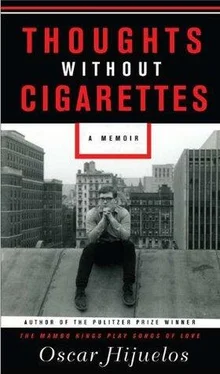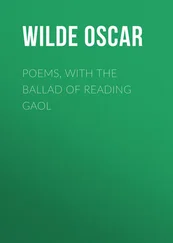At the Escorial, that storied royal residence north of Madrid, I felt the heaviness of Spanish history everywhere around me, and it made me sad. I already tended to think about all the people who had died in this world, and in Spain, perhaps because of the aged cripples and maimed survivors of the civil war who were still to be seen begging on the streets everywhere, the fleeting nature of existence followed me about like a ghost. In Seville, I wandered about the Gypsy neighborhoods, on the outskirts of the city, whose passageways and streets were too narrow for police cars to go through, seeking out bars where I might hear authentic flamenco music. (It was a miracle that someone didn’t rob me.) In Guernica, my heart stopped: I had gone into a slot machine parlor one evening, feeling smugly self-assured that even if I had been rarely accepted as a Cuban Latino in the states, I could at least pass as a Spaniard, más o menos , in Spain when an old man cast a dirty look my way, and then, further shattering my delusions, raised his right arm, his palm held straight up, and saluted me, saying: “ Sig Heil! ” Then he spat on the floor.
On a long train ride in an acrid car reeking of tobacco, animals, and soot across Gallicia, I ached with an inexplicable feeling of belonging (my pop’s side of the family were Gallegos after all) and yet, at the same time, I could not produce a single name of a relative or a town to visit there. (That ached as well.) On such a train, one couldn’t help but fall into conversation with the farmers who traveled on them: One such farmer, feeling deeply touched (the more educated the Spaniard, the less touched he or she felt by my nostalgia for those roots) by the fact that I was by ancestry a paisano , and thinking me a rich American, offered to sell me a farm of some twenty hectares for (converting from pesetas) roughly fourteen thousand dollars. (How interesting that would have been, had I had that kind of money.) Later, I made like a pilgrim, visiting the sacred cathedral in Santíago, but oddly, though I’d been told that it was a very special place — even some of the guidebooks said that it had a mystical air — I, who considered myself cut very much from my mother’s cloth, and therefore superstitious, felt nothing at all in that place. Among my other excursions in Gallicia, I took a ferry out to la isla de Cies, an island off the Atlantic coast of Spain that had been reconfigured with dunes and trees and white sands and driftwood in the manner of California beaches after Franco, smitten by a visit there and, as a dictator, able to move mountains if he so liked, had ordered it done. I saw my first nude beaches there and narrowly escaped getting beat up by a gaggle of older Spanish women who had happened along the same spot overlooking a cliff where I, el stupido, had stood posing before a camera on which I had set off a timer; as those women approached, and I ducked into the bushes, the camera, set on top of a rock, clicked as if I had been waiting, in fact, to get shots of their tanned, spectacularly drooping bodies. (During the two-hour journey back, I had to contend with their accusations, their scornful expressions, and the fact that they told anyone they could that I was “the one with the filthy mind.” Did I care? All I knew was that I wasn’t standing on a subway platform somewhere deep in Brooklyn on a hot summer afternoon.)
Traveling all around the Iberian Peninsula, I ended my Spanish journey in Barcelona, where, indeed, many of those Catalans were as fair (and sometimes balding) as I. Roaming its streets, I couldn’t help but wonder where my maternal grandfather’s family had once lived, or whether my mother and her sisters had been aware of such landmarks as the Parque Guell or the other insanely ornate buildings Gaudí had designed, during their visits there as children. I wandered the old quarters of the city endlessly, bought countless novels from the kiosks off the Ramblas, editions of works by García Marquez, Borges, Italo Calvino, Vargas Llosa, and Neruda, to name a few, for my planned Spanish library in Rome. (I swore that I would get through every single one of them.) I haunted the guitar shops of Barcelona, trying out one instrument after another, no matter how much it cost, despite a budget of about one hundred dollars. Eventually, I bought a real beauty, manufactured by the House of Struch in 1985, an orange wood, mellow-toned guitar, which sits in this very room behind me as I write.
On the very day I was to leave for Rome with my new guitar in hand, my valise weighing even more from newly purchased books, and my head dense with recent memories, I got a little careless and allowed my radar to turn off. Overdoing the vino (and cigarettes) at lunch, as I made my way to the central station in Barcelona, all the while feeling as if I were Mr. Slick New Yorker, my wallet with all my cash vanished, some fellow having picked my pocket in the crowded square.
Fortunately, though I had nothing more than a few pesetas in change left, I had kept my ticket and passport stashed inside my shirt; brooding, I settled into my second-class compartment and was wondering what I would do over the two-day journey to Rome for food when into that car came four cheerful, not-bad-looking Spanish nurses in their late twenties, from Merida. They were toting picnic baskets filled with food and wine and chocolates, and hearing the story of how I had been pickpocketed, took pity, and tenderly so, on this americano. Europe? God, I loved it!

Though my nearly two-year stay in Italy probably deserves far more space than anyone’s patience should allow, I will frame this little part of the book as a love story of a sort, for no sooner had I arrived in that city than did I become intoxicated with the Latino-ness of Rome and a lifestyle that, every day I lived there, somehow conformed with my memories (perhaps) and fantasies (definitely) of what life must have been like in Cuba before the fall, or, in the machinations of that longish narrative I had been fooling around with, Havana itself.
Rife with birdsong, blossoming gardens, high arching palm trees, and tropical vegetation everywhere, as well as a populace of outspoken, charismatic, friendly, occasionally curmudgeonly, stylish, and earthy people — with no end to the dazzling women, of all ages, there — Rome, that “great outdoor museum,” as Malraux once put it, pressed so many wonderful buttons inside me that for much of my time there, I became a new and improved version of myself, still tightly wound but, for the most part, really enjoying my life for a change.
Just walking those streets, especially in neighborhoods like Trastevere or by the Aventine, I’d stroll through the markets, absorbing, with almost a hunger, not just the scents of the marvelous breads and herbs and flowers that were everywhere, but the bel canto of the Italian language itself, which, for some reason, I felt far more at ease navigating than even my ancestral español . In fact, I used the Spanish I’d more or less improved upon during my recent travels to help me get along with the Italians. (Down in Naples, the Italian almost sounds like Castilian sometimes.) They understood me completely, and, because it was not my emotional turf to defend, I eventually flourished, or at least more easily in a street-friendly getting-around fashion. Though I attempted to decipher the daily newspapers, which were always remarkably slangy, and the writings of Borges, Cortázar, and Calvino in their Mondadori translations — incredibly, as in Spain, “literature” could be found in the racks of the sidewalk kiosks alongside Donald Duck or Paparone comics, religious tomes on Padre Pio, and some of the raunchiest porno I’d ever seen — it wasn’t anything I came close to mastering, at least not in the way that a few good solid years of study would have afforded me.
Читать дальше













